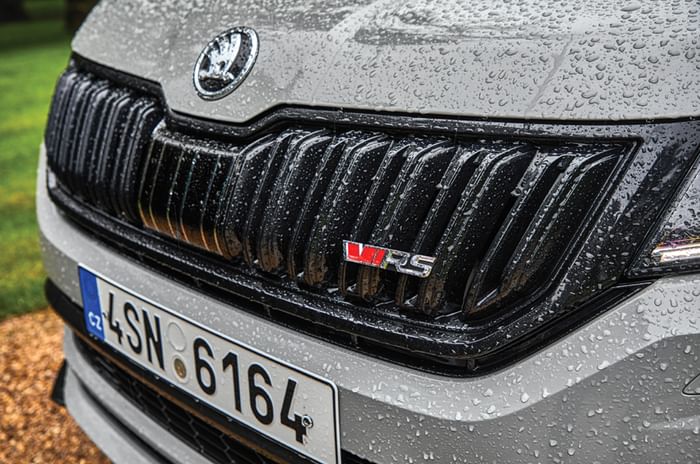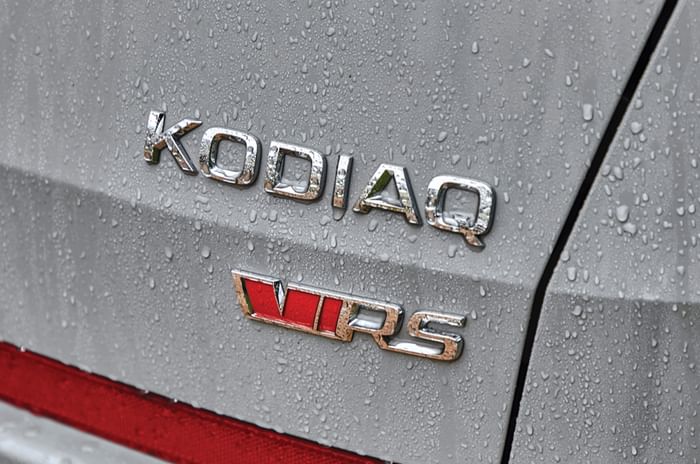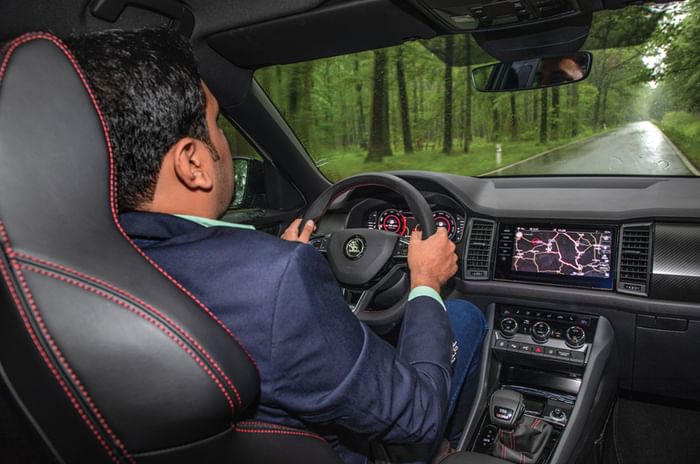What is it?
The Kodiaq RS made an attempt at proving its capabilities even before it was fully revealed. Sporting camouflage wrap, the hot SUV – in stock form – lapped the 20.832km- long Nürburgring-Nordschleife in 9min 29.84sec, the quickest-ever for a seven-seater SUV. Talk about making a strong first impression.
Now, the Kodiaq may be a record holder, but as far as lap timings go, 9min 29.84sec isn’t exactly what most automakers are jostling to beat. But what it does signify is that this Kodiaq is no slouch, which really is something of a pre-requisite if it’s wearing the vRS logo. In fact, this is Skoda’s first hot SUV and the second model in its vRS line-up after the Octavia, since the Fabia vRS was axed. So, what are the go-faster bits that separate it from the regular Kodiaq?

Grille receives a gloss black treatment.
What's it like on the outside?
As with all RS models, Skoda’s large SUV receives a sporty makeover that includes front and rear bumpers mildly redesigned to look more aggressive, a glossy black finish for the grille and window line, side skirts finished in black and a roof-mounted spoiler. But what particularly adds to the wow factor are the 20-inch alloys, red calipers and twin chrome exhaust pipes. Completing the performance-oriented styling is the new ‘RS’ logo itself, which made its debut on this SUV. It now has a red ‘v’ ahead of the RS, in place of the green used earlier. LEDs headlights and tail-lamps are offered as standard. Overall, the body kit boosts the style quotient of what is already a good-looking car.

Debuts new RS logo that replaces green with red.
What's it like on the inside?
The cabin is well laid out, with good-quality materials used in most places. There’s red stitching on the seats, steering wheel, gear selector, armrests and, with faux carbon-fibre trim on the dashboard and doors, the interior cuts quite a purposeful figure. Of course, there’s also the RS logo on the steering and gearstick, and plenty of Alcantara all around. The Kodiaq RS comes with big sport seats with integrated headrests that are snug-fitting and offer fantastic support.
Skoda’s Virtual Cockpit is offered as standard, with a ‘Sport View’ that places the rev counter in the centre around the speedo. The Kodiaq is known to combine spaciousness and practicality and the RS remains unaffected in that respect; there’s seating for seven and a massive boot space with the third row folded. But this is an RS. So the real question is, how does it drive?
What's it like to drive?
All this talk of sportiness might have led you to believe that there’s a thumping petrol V8 under the hood. But oddly, there isn’t. Instead, Skoda has chosen to equip the Kodiaq RS with a 240hp, 2.0-litre, four-cylinder diesel – its most powerful oil burner ever. While the brand had evaluated both petrol and diesel versions of the RS, it chose to go with diesel as torque was really important. Sure enough, the Kodiaq RS has a mammoth 500Nm of pulling power – highest in the Skoda range – which, along with the 240hp, is distributed to all the wheels. The engine is mated to a 7-speed dual-clutch transmission (DSG) and all-wheel-drive is offered as standard. Skoda says the Kodiaq comes with Dynamic Chassis Control (DCC) as standard, which provides “optimal shock absorption to suit the surface and driving style”.
Our drive through the beautiful, narrow, winding roads of the Czech countryside was brief, and for most part, took place under wet conditions. But it did allow us to get a decent feel of the SUV.
The twin-turbocharged diesel is refined and surprisingly rev-happy. There are six driving modes – Eco, Comfort, Normal, Sport, Individual and Snow – to choose from, but given our limited time, and also in true RS fashion, we chose to largely stick to Sport. The Kodiaq RS builds speed briskly from standstill and gear shifts are well executed in the regular D mode. Things are smooth for the most part but there’s a slight hesitation in lower gears under hard acceleration – this can be easily overcome with some modulation of the throttle. Of course, you could choose to shift through the ratios manually via paddleshifters. Sport mode locks the engine in its mid-range and keeps it at 2,000rpm, while Comfort mode will drop revs to 1,500rpm.

Grippy sport seats get red stitching; precise steering offered good control in wet.
For its 1,880kg kerb weight, the Kodiaq RS handled well in the wet, twisty sections, and the steering was accurate, delivering sharp turn-ins when called for. However, running on 20-inch wheels and 235/45 low-profile tyres, the ride was stiff and harsh bumps were felt in the cabin.
And then there’s the sound. The Kodiaq sounds sporty, especially in its most potent setting, and you soon realise – it’s quite nice for a diesel. Turns out, it uses a system that engages the sound enhancers fitted to the exhaust; this artificially produces a mildly throaty growl to mask the diesel clatter. Not so bad if you’re inside with the windows rolled up and sound piping in through the speakers, but if you’re outside, the combination of the engine’s diesel drone and the synthesised exhaust note can be slightly baffling.
Should I buy one?
Or the real question is, what are the prospects of buying a Kodiaq RS in India? Unfortunately, they’re close to none because the model is presently not on Skoda’s radar for India. It costs about Rs 38 lakh in the UK, so even if it comes in as a CBU, steep import duties could take up the price beyond what most customers would be willing to pay. But if it does, you’ll be happy to know the RS is agile, refined and offers a sumptuous prospect of an engaging driving experience, while accommodating your friends and their paraphernalia.











































